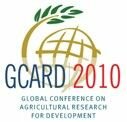The latest draft of the GCARD Road Map has now been released: Transforming Agricultural Research for Development (AR4D) Systems for Global Impact

The Global Conference on Agricultural Research for Development (GCARD) is organized by the Global Forum on Agricultural Research (GFAR), in association with the reform process of the Consultative Group on International Agricultural Research (CGIAR). The GCARD process is radically reshaping agricultural innovation and its significance in meeting key Millennium Development Goals.
The global fragmentation and under-resourcing of public innovation, education and advisory processes and weak linkages with wider development processes and with farmers, NGOs and the private sector, are major bottlenecks constraining the value and impact of agricultural innovation on the lives and livelihoods of the poor.
The contributions and dynamic interaction of thousands of stakeholders from all sectors have created the GCARD Roadmap, providing a clear path forward for all involved. The Roadmap highlights the urgent changes required in AR4D systems globally, to address worldwide goals of reducing hunger and poverty, while ensuring environmental sustainability and meeting the needs of resource-poor farmers and consumers.
The GCARD Roadmap establishes an inclusive, rolling process of reform and capacity development that aims to mobilize the full power of agricultural knowledge and innovation towards meeting agriculture and food-related development needs. It proposes a six-point plan for transforming agricultural research for development around the world, requiring actions from all those involved in the generation, access and use of agricultural knowledge:
1. The need for collective focus on key priorities, as determined and shaped by science and society,
2. The need for true and effective partnership between research and those it serves,
3. Increased investments to meet the huge challenges ahead and ensure the required development returns from AR4D
4. Greater capacities to generate, share and make use of agricultural knowledge for development change among all actors
5. Effective linkages that embed research in the wider development context and actions enabling developmental change
6. Better demonstration and awareness of the development impact and returns from agricultural innovation.
The Roadmap shows that this transformation is the responsibility of all those who care about the future of agriculture and its role in development. “Business as usual” is no longer an option; the time for action is now.
The Roadmap is an evolving document that has been produced through the open consultations and interactions of the GCARD process. It aims to promote discussion, partnership and actions around these key themes. Your feedback is welcome: .

